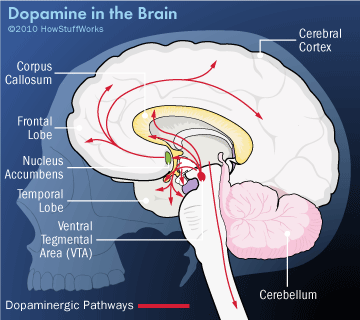
It’s fair to say that anyone that’s in the music business likes music. No, make that loves music. We’ve all had that rush when hearing a song that’s a feeling like no other. And to play it in front of people is taking it to yet another level.
Now there’s been a definitive study that really gets down to why we love music. It’s called The Neurochemistry of Music and takes a look inside the brain of music lovers. Here’s some of what they found.
- When we first hear a song, it stimulates our auditory cortex, and we convert the rhythm, melody and harmony into a coherent whole. From there certain parts of the brain react depending upon how much we like the music. Sing along and you’ll active the premotor cortex, which coordinates your movements. Dance along and your neurons actually synchronize with the beat of the music. Your prefrontal cortex may also be stimulated, which can prompt personal memories.
- Brain imaging shows our favorite songs trigger the brain’s pleasure points, and a significant amount of those internal drugs that we all love, serotonin, dopamine and oxytocin, are released. The more we like a song, the more these neurochemicals are released. Music becomes a drug!
- This happens with everyone, but it happens more intensely if you’re young. People between the ages of 12 and 22 get a giant dose because of the stage in their hormonal development that they’re in. This explains why the main audience for music has always been between those ages.
- Those musical memories that we experience at that point are hardwired into our brains and stay with us for the rest of our lives, which explains why we’re always partial to the music of our youth.
- Because of the impact that the music of our youth has on us, it becomes a part of our social self-image, although the effect appears to diminish over time.
Does any of this sound familiar? These points are things that we really all inherently known, but now it’s nice to have a study to back it up.

